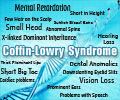Prevention of Intellectual disability
Intellectual disability can be prevented by identifying the risk factors and causes. Measures can be taken in early life to prevent the condition in some cases.
Intellectual disability can be prevented to some extent by identifying the causal factors. Adequate measures have to be taken at the following stages of development.
- Genetic counseling for the parents-to-be, if there are risk factors like hereditary disabilities or partners are blood relatives.
- Prenatal care and advice to the mother like avoiding certain medicines, alcohol, smoking, drugs and other things that can harm the development of the fetus.
- Prenatal nutrition has to be taken care, adding extra folic acid to the mother’s diet.
- Perinatal care: Adequate measures need to be taken to ensure safe birth of the child. Oxygen deprivation, forceps delivery and breech birth have to be avoided or administered carefully.
- Vaccination schedule must be followed, without fail, to ensure diseases like measles, meningitis and others are kept away.
- Newborn screening can help identify the problem early and measures can be taken to reduce the impact of the disability.
- Prevent head injuries during early childhood with safety seat belts and bicycle helmets.
- Adequate nutrition during early childhood should be advised.
- Identifying the risk factors such as hereditary or genetic anomalies and looking out for signs of intellectual disability in young children can help begin the intervention early.
- Screening for metabolic disorders can be done at early age.











